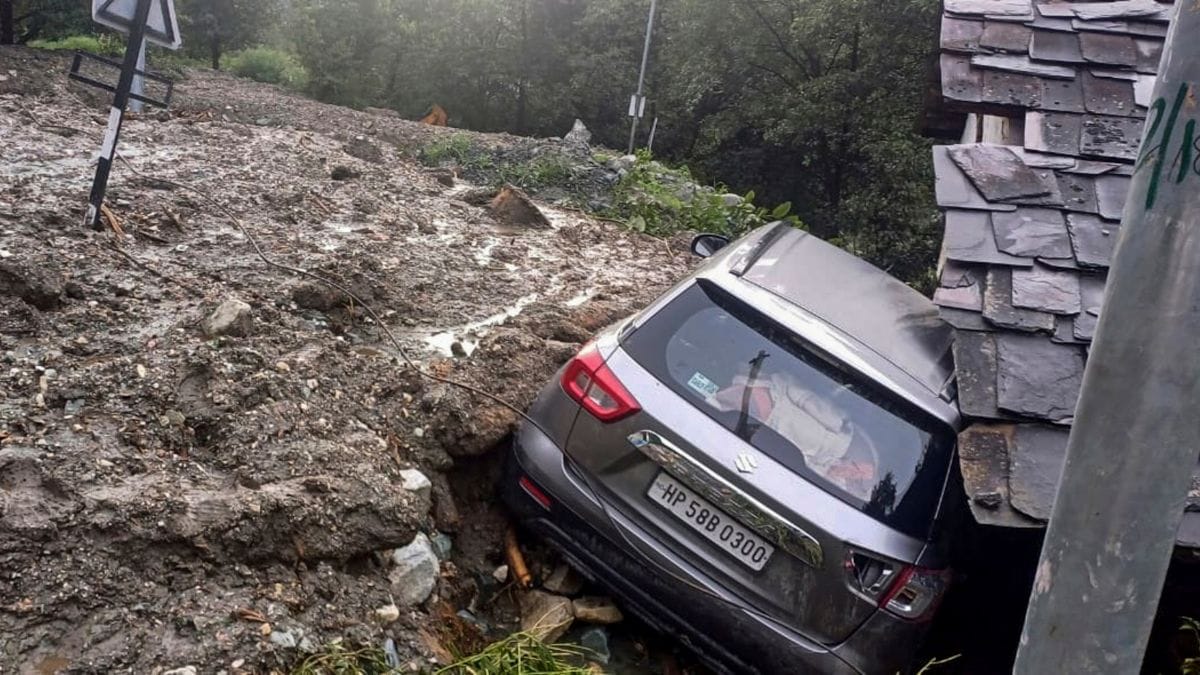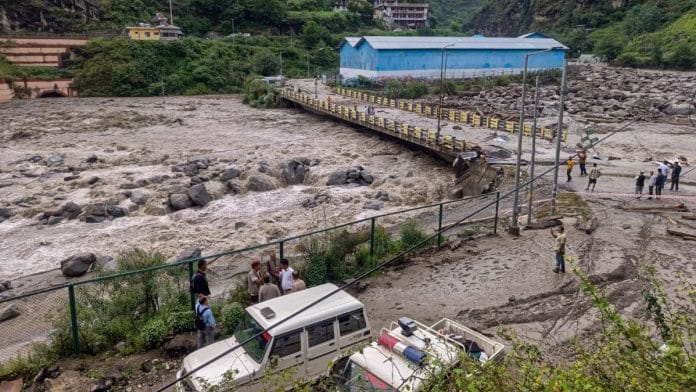Shimla: Torrential monsoon rains and cloudbursts unleashed chaos across Himachal Pradesh Wednesday, with the Indira Priyadarshini Hydroelectric Project (IPHP) near Khaniyara, Dharamshala, bearing the brunt of the devastation.
Kangra Deputy Commissioner Hemraj Bairwa said that over 20 labourers working at the mini-hydroelectric project were feared swept away by flash floods in the Manuni Khad, with two bodies recovered so far. Official confirmation is awaited.
As rescue operations continue, the state grapples with widespread losses in Kullu and other districts, prompting urgent calls for environmental accountability and disaster preparedness.
On 25 June, around 2 pm, a sudden surge in the Manuni Khad, fuelled by heavy rainfall and runoff from nearby drains, inundated the labour colony at the IPHP site in Kangra district.
Approximately 280 labourers were resting in temporary shelters, as work on the project had been halted due to the rain. About 260 have been rescued.
“Rescue teams are combing the area, and we’re verifying the headcount to determine the exact number of missing persons,” Bairwa said.
Eyewitness Daya Kishan, a labourer from Doda, Jammu and Kashmir, described the harrowing scene to local media persons: “We were 28 people, some eating lunch, when the water started rising. By the time we reached the road, the flow was overwhelming. We tried to warn others, but it happened too fast.”
Superintendent of Police Shalini Agnihotri noted that the State Disaster Response Force (SDRF), police and local administration are conducting search operations along the Khad and surrounding hillsides.
Local Panchayat Pradhan Amar Singh blamed the hydro company’s practices, alleging that debris dumping and tree felling altered the Khad’s natural flow, worsening the flood’s impact.
“We had raised this with the administration, but no action was taken,” Singh told ThePrint.
A prior incident at the site saw equipment and trucks damaged by flooding, highlighting recurring risks.
Dharamshala MLA Sudhir Sharma, too, estimated that 15-20 labourers were washed away.
Chief Minister Sukhvinder Singh Sukhu and BJP national president J.P. Nadda expressed condolences, pledging support for relief efforts.
Also read: Why Himachal is unwilling to release water for long-delayed Kishau multipurpose project
Devastation across Himachal Pradesh
The monsoon’s wrath extended beyond Kangra, with Kullu district reporting severe losses due to three confirmed cloudbursts in Jiva Nala (Sainj Valley), Hurla Nala (Garsa Valley) and Horangad (Banjar area).
At least three people were swept away in Kullu while attempting to salvage their belongings, and infrastructure damage was extensive.

Eight vehicles, 10 culverts and a power project were destroyed, while a temporary bridge in Manikaran Valley collapsed, isolating Baladhi village. Over 2,000 tourists remain stranded, and the Aut-Luhri-Sainj highway is blocked.
In Banjar, floods damaged a government school, agricultural land and a cowshed.
Landslides disrupted roads in Lahaul and Spiti, including the Kaza-Samdoh route.
Across the state, swollen rivers like the Beas and Sutlej threaten further damage, and water supply systems have been disrupted in multiple areas. The government has restricted tourist access to rivers and suspended water sports in Kullu, Bilaspur and Una to prevent additional casualties.
Weather forecast and alerts
The India Meteorological Department (IMD) has issued an orange alert for heavy to very heavy rainfall, thunderstorms and lightning in Una, Bilaspur, Hamirpur, Chamba, Kangra, Mandi and Sirmaur until 29 June.
A yellow alert covers Kullu, Shimla and Solan for isolated heavy rain. Light to moderate rainfall is expected statewide until July 1, with a low to moderate flash flood risk in Chamba, Kangra, Mandi, Shimla and Sirmaur through 26 June.
Palampur has recorded 145.5 mm of rain since Tuesday, followed by Jogindernagar (113 mm) and Dharamshala (54.1 mm). The IMD urged residents to avoid rivers and low-lying areas, citing risks of landslides and flash floods.
Environmental and systemic concerns
The disaster has spotlighted the environmental toll of hydropower projects. Experts attribute increased flood risks to debris dumping, deforestation and unplanned infrastructure in Himachal’s fragile ecology.
A 2022 state report flagged all 77 blocks as landslide-prone, citing concrete construction and forest loss. Climate change, with warming hills and erratic monsoons, is intensifying cloudbursts, according to scientists. The state’s disaster management system, despite operational control rooms, struggled to cope with the flooding’s scale, echoing the 2023 monsoon’s Rs 10,000 crore losses.
Ongoing relief efforts
The government has deployed the SDRF, National Disaster Response Force (NDRF) and police for rescue and relief operations. Relief camps are operational, and essential supplies are being distributed.
The administration is evacuating stranded tourists and locals, though continuous rain hampers efforts. Emergency advisories urge residents to avoid hillsides and rivers, with contact numbers circulated for assistance.
The central government has been approached for aid, with former Union minister Anurag Thakur coordinating support.
(Edited by Sugita Katyal)
Also read: Himachal opens Shipki La pass to tourists. Significance of historical link for trade & pilgrimage






